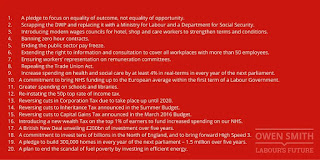The key areas where I believe Smith has the edge over Jeremy Corbyn are on policies, economic competence and the EU. If these issues are front and centre in the campaign until September then Smith will be in with a chance. The other, potentially crucial, advantage Owen Smith has over Jeremy Corbyn is the use of the mainstream media. It's been clear that Owen has had a much greater presence on television in particular, this means a greater reach and greater cut through with his ideas.
The setbacks so far have been largely at the hands of due diligence. The handling and process of calling a challenge has been the major line of attack from Corbyn, the argument against this had begun to form judging by the hustings last night. The high court decision could be further ammunition for Corbyn on this front.
Lines of Attack
The important thing for Owen Smith is to establish clear differences between himself and Corbyn. This is vital because members won't be interested in a watered down version of the same thing, so to establish differences and make clear there is a choice, is vital. From my point of view, the biggest difference between the two candidates and a huge potential vote winner for Smith is the quality and detail of policies. The party has been starved of policy based debate in the past year so if Smith can focus arguments on the quality and substance in his policies this will be a major point.
 |
| The beauty is the detail |
This is a good link to how and why Owen Smith wins when it comes to the economy. While Corbyn focuses on emphasising a fair economy for all, his argument against lacks specifics of how this will be achieved. The amount of thought out and fully funded ideas from Smith makes clear the lack of substance Corbyn offers. The lack of policy based debate on the economy or any other area before this leadership race means there is a thirst and an interest which Smith can play to.
Finally on the EU, Smith has made a bold move to continue fighting against Brexit, possibly to the point of a second referendum. While this may be a harder sell to the wider electorate at the moment, I think it is a well judged stance for the membership. The reason I think it is well judged is because many Labour supporters voted to stay in and are dismayed that the country could be leaving, it is also clear that many members don't believe Corbyn showed enough passion for, or commitment to, the EU. The combination of these issues mean Smith's stance could be a vote winner, while it also portrays Corbyn to still be less enthusiastic about the EU than Smith.
The ability to spread these key issues and the content and substance Smith offers through the mainstream media means he will reach members who don't attend rallies or hustings. As long as Corbyn remains inward looking, focusing his attention on those who attend his rallies rather than television appearances I don't believe he is reaching as big an audience as he could. This could prove to be a key area in the campaign.
The Debate Focus
As with any election the debates will be crucial to the outcome and therefore both candidates have to have strategies ready to use in order to try to emphasise their strengths. My advice to Owen Smith would be to continually ask Corbyn, how? When Jeremy mentions one of his broad, idealistic 'policies' then the simple but effective response would be to ask specifically how he would achieve this. I don't believe he would be able to provide the specific taxes or cuts or funded investment to back up his claim. This would emphasise the difference between the lightweight Corbyn and the content backed Smith.
I would also try to force Corbyn to talk numbers and cold hard facts. I'm not sure Corbyn has a grasp on the numbers and the weighting behind his ideas, if the conversation was to go this way then it would show not only his inability to back up his phrases but highlight the competence and advantage Smith has on the economy and on policy. On the EU I would also try to get Corbyn to commit to a stance, what sort of deal would he accept, what his red lines are and whether he would ever fight to keep Britain in the EU again. Smith's advantage in this area is that his opinion is clear, he would fight to stay in and would put any tabled deal to the public to rubber stamp. Corbyn's stance is still unclear so it is an area that can be probed and Smith's advantage increased.
 |
| The Blairite Witch Project |
In Conclusion
The strategy and almost chess like point and counter point of politics is one of the reasons I am so passionate about politics. Thinking about the strengths and weaknesses of you and your opponent, planning the lines of attack, responses to it and how to respond to that response is, in my view, a basic element of successful politics. It is an element that I haven't really seen from Corbyn and one of the reasons I am backing Owen Smith, who has clearly deployed a strategic and thought out campaign so far.
I believe if Owen Smith continues to employ the same tactics and maybe takes some of my ideas on board then I believe he can win, or at least make it a very close battle for the leadership. I admit my own bias in this piece but I tried to be as fair as possible. In the interest of fairness, if I get requests I'll happily write a similar piece on the strategies that Corbyn could use to boost his chances too.
Hope you've found this interesting, here's to a friendly and policy filled campaign.



